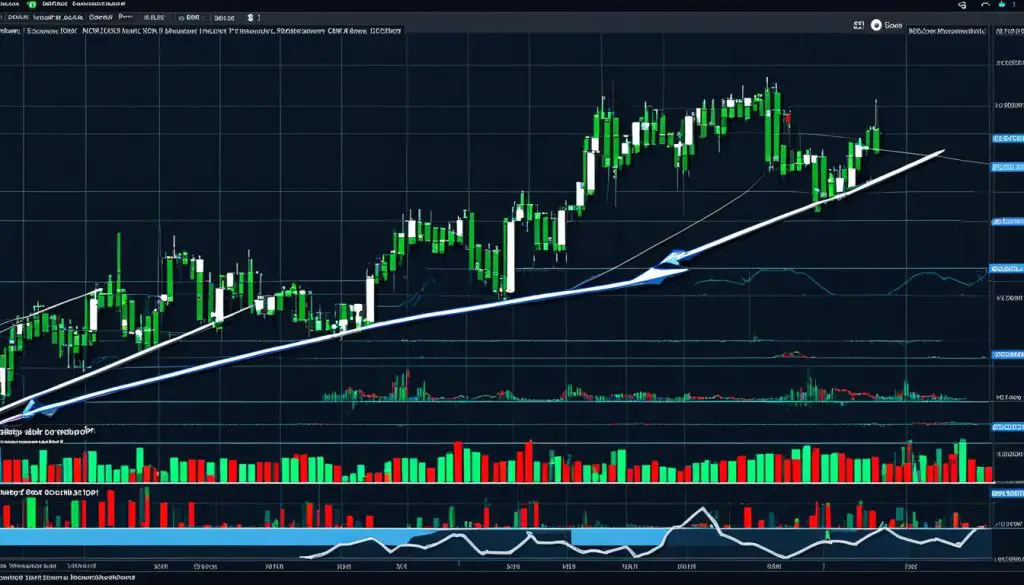For individuals intrigued by the financial markets, a prevalent question lingers: Is forex trading legal in America? The landscape of trading currencies legally within the United States boasts a rigorous structure regulated by two pivotal institutions: the Commodity Futures Trading Commission (CFTC) and the National Futures Association (NFA). These bodies are the linchpins securing the legalities of forex trading in the US, ensuring that market operators conform to the highest standards.
The robust nature of US forex trading laws reflects the country’s position in the market, with the U.S. Dollar (USD) involved in a significant slice of the forex transactions worldwide. Aspiring and seasoned traders alike must recognize that involvement in this market comes with a necessity to navigate through an established regulatory framework meticulously crafted to shield participants from potential scams and financial malfeasance. Indeed, to operate within the bounds of law, forex brokers in America are mandated to register as Retail Foreign Exchange Dealers (RFED) with the CFTC and must also hold the status of Futures Commission Merchants (FCM) with the NFA.
The legal contour of forex trading maintains a sturdy presence, characterized by stringent regulations including hefty capital requirements—a minimum of $20 million. This regulatory stronghold fosters a trusted environment, embedding confidence in market participants. Yet, it implores traders to engage in extensive due diligence, verifying their brokers with the NFA’s BASIC tool, and to tread with an acute understanding of the high-risk exposure when trading Contracts for Difference (CFDs), which bear the potential for substantial financial losses.
America’s Regulatory Environment for Forex Trading
The landscape of Forex trading regulations in the United States is defined by stringent laws and oversight entities that together create a robust framework for market participants. Two primary bodies govern these regulations: the Commodity Futures Trading Commission (CFTC) and the National Futures Association (NFA). Their combined efforts in oversight and regulation contribute to the legalities of forex trading in the US, establishing a secure environment that protects trader interests and maintains market integrity.
The Role of the CFTC and NFA in Forex Regulation
As the federal agency founded by the USA Congress, the CFTC wields a significant mandate to oversee the vast derivatives markets, including forex trading. This regulatory body ensures that the market is transparent, competitive, and financially sound, thus protecting market users from abuse and fraudulent activities.
Working in tandem with the CFTC, the NFA operates as a self-regulatory organization, enforcing strict standards and best practices among its members. Forex brokers and other entities participating in currency exchange within the US borders must adhere to NFA’s stringent operational guidelines to maintain their status as regulated entities.
Compliance Requirements for U.S. Forex Brokers
In the US, Forex brokers are obligated to fulfill various compliance requirements to legally engage in currency trading activities. These obligations are established to safeguard the marketplace and its participants from unforeseen risks and unethical practices.
Brokers must register with regulatory bodies and meet the capital requirements that bolster financial stability. Moreover, they are subjected to rigorous audits and oversight to ensure they maintain fair and ethical trading environments for their clients.
The Impact of Dodd-Frank Act on Forex Trading
The Dodd-Frank Wall Street Reform and Consumer Protection Act, passed in the aftermath of the 2008 financial crisis, introduced significant changes to the legalities governing forex trading in the US. One of its most profound impacts was the broadening of regulatory oversight for forex transactions, which reduced marketplace ambiguity and increased trader protection against fraud and manipulation.
| Regulatory Body | Mandate | Key Functions |
|---|---|---|
| CFTC | Oversee derivatives markets including forex | Maintain market integrity, combat fraud and abuse, monitor reporting |
| NFA | Self-regulatory organization for derivatives industry | Enforce compliance with NFA rules, offer arbitration and mediation, educate investors |
| Dodd-Frank Act | Reform financial regulation to prevent future crisis | Increased oversight of forex brokers, enhanced consumer protection |
Diligence and compliance with these regulatory frameworks ensure that the US remains a benchmark for forex trade legality, security, and market stability worldwide.
Legalities of Forex Trading in the US: An Overview
The legal framework of forex trading in the US is a complex but well-structured system designed to regulate and stabilize the forex market. At the core of this framework lies the Commodity Exchange Act (CEA), which establishes the groundwork for oversight and regulation by key authorities such as the Commodity Futures Trading Commission (CFTC) and the National Futures Association (NFA). The forex trading legality in America depends significantly on compliance with this foundational legislation and subsequent financial standards.
Understanding the Commodity Exchange Act
The Commodity Exchange Act is the cornerstone of forex regulation in America, providing the legal basis for the operations of the CFTC and NFA. It defines the regulatory purview of these bodies, ensuring that all market participants adhere to ethical trading practices, and offers protection to traders through stringent oversight protocols.
Registration and Oversight by Regulatory Bodies
All forex brokers operating within the United States are mandated to register as Futures Commission Merchants (FCMs) and Forex Dealer Members (FDMs). This requirement is crucial for maintaining a transparent trading environment where brokers are regularly audited for compliance, ultimately bolstering the security and stability of the forex market in America.
CFDs and the Risk of Trading with Leverage
Closely tied to forex trading are Contracts for Differences (CFDs), which allow traders to speculate on price movements without owning the underlying asset. While CFDs offer the potential for significant profits, they also carry a substantial risk due to the use of leverage. It is paramount for traders to understand the high stakes involved in trading CFDs, as leverage can exponentially magnify both gains and losses, potentially leading to a complete depletion of capital.
| Regulatory Requirement | Purpose | Body Responsible |
|---|---|---|
| Registration as FCMs and FDMs | To ensure brokers comply with financial and ethical standards | CFTC and NFA |
| Maintenance of adequate capital | To protect customers from broker insolvency and to promote market stability | CFTC and NFA |
| Adherence to leverage limits | To mitigate excessive risk-taking associated with high leverage in trading | CFTC |
| Participation in Reparations Program and arbitration process | To provide mechanisms for resolution of trade disputes and reparations | CFTC and NFA |
How to Verify the Legitimacy of U.S. Forex Brokers
Before engaging in forex trading, it is critical for traders to ascertain the legitimacy of their chosen brokers. A fundamental step in this process involves verifying CFTC registration and confirming whether a broker is among NFA regulated forex brokers. Each broker in the United States should be associated with a unique NFA ID number—a requirement mandated by US forex trading laws. By harnessing the NFA’s BASIC tool, traders can effortlessly check this ID for absolute peace of mind, ensuring their prospective broker adheres to the stringent guidelines laid down by the regulatory authorities.
It’s crucial to remember that falling victim to fraudulent forex brokers can lead to significant monetary losses. These illegitimate entities often lure their targets through diverse channels, including social media platforms and offers from offshore entities that remain unsanctioned by U.S. regulators. Due diligence in spotting such deceptive practices can safeguard a trader’s financial interests substantially.
- Educate yourself about the common tactics used by fraudulent forex schemes.
- Be skeptical of excessive promises of high returns with low risk.
- Always confirm the broker’s NFA ID using credible resources.
- Understand the full extent of US forex trading laws to recognize non-compliance.
The table below serves as a guide to help traders in verifying the registration of U.S. forex brokers and understanding their regulatory status:
| Verification Aspect | Action Required | Resource for Verification |
|---|---|---|
| CFTC Registration | Check the broker’s regulatory status and background | NFA BASIC Tool |
| NFA Membership | Confirm active membership and compliance | NFA BASIC Tool |
| Regulatory History | Review any past violations or enforcement actions | NFA BASIC Tool, CFTC website |
| Customer Reviews | Gather insights from other traders’ experiences | Independent review sites, trading communities |
Traders who rigorously follow these verification steps contribute to a safer trading environment. Thus, thorough validation not only protects one’s capital but also bolsters the integrity of the U.S forex market as a whole.
Trading Forex in the United States: Safe Practices
As participants navigate the forex market within the United States, adherence to safe trading practices is essential for minimizing risks and enhancing the security of their investments. By highlighting strategic steps and precautions, traders can safeguard their interests within the confines of forex trading safety in the US.
Steps for Ensuring Safe Forex Trading
Choosing a reputable broker licensed by key regulatory bodies ensures compliance with trading forex restrictions in the United States. Thorough application processes lay the groundwork for secure trading experiences. A foundational step is grounding oneself with the various trading platforms through the use of demo accounts, which facilitates a risk-free environment to learn. Additionally, formulating a well-thought-out trading strategy is crucial for ongoing success.
Risk Warning: Understanding Market Risks and Broker Transparency
Forex trading involves inherent risks which must be clearly understood by all market participants. The potential for loss can be accentuated by factors such as dealer intervention on trading platforms. It’s imperative for traders to assess and comprehend these risks to enhance forex trading safety in the US. Transparency from brokers on their operational methodologies can add a layer of reassurance for cautious traders.
Tips for Protecting Your Investments in Forex
Protecting one’s forex investments involves several vital actions. Verification of broker-quoted prices against independent sources can uncover discrepancies. Gaining an understanding of the requirements related to funding and withdrawals prevents misunderstandings and potential financial loss. Keeping an eye on market legitimacy ensures that investments are not subject to undue risk from malpractice. With heightened awareness, traders can confidently mitigate the hazards of the forex market.
| Key Actions for Safe Forex Trading | Benefits | Considerations |
|---|---|---|
| Verification of Brokers | Confidence in legitimacy and regulatory compliance | Requires due diligence and research |
| Learning Platforms via Demos | Risk-free exploration of trading systems | May not fully replicate live trading conditions |
| Development of a Trading Strategy | Framework for managing trades and risks | Needs adaptation to changing market dynamics |
| Understanding Broker Transparency | Clarity on trade execution and pricing | Broker’s policies may vary |
| Monitoring Market Legitimacy | Peace of mind in market operations | Constant vigilance is required |
- Always engage with NFA and CFTC regulated brokers.
- Emphasize meticulous verification of broker credentials.
- Use demo accounts to acclimate to trading platforms.
- Verify broker prices with third-party sources to ensure fairness.
- Stay informed about the realities of leveraging and the risks it presents.
In conclusion, trading forex in the United States necessitates a blend of informed strategies and protective measures. By acknowledging forex trading restrictions and embracing a safety-first approach, traders in the US can confidently participate in forex markets with a greater sense of security and preparedness.
US Forex Trading Laws and Trader Responsibilities
Within the realm of forex trading, the legality of forex trading in America hinges on strict adherence to a set of established laws and trader obligations. Designed to mitigate market manipulations and uphold fiscal integrity, these laws are pivotal for the maintenance of a transparent and stable trading environment.
Navigating U.S. Anti-Hedging and Leverage Laws
To curtail the excessive risk-taking and potential market disruption, US anti-hedging laws forbid traders from simultaneously holding opposite positions in the same forex currency pair. Leverage, a tool that allows traders to multiply their market exposure, is equally regulated. The permissible leverage ratios are tailored to the type of forex account and the specific instruments involved, typically ranging from 1:10 to 1:50. Traders must navigate these rules with foresight and precision to successfully engage in the forex market.
Guidelines for Forex Trading Tax Compliance
Forex traders must also remain vigilant of their tax obligations in the US. Recognizing this, they are responsible for reporting forex gains and losses. The delineation of trader status and corresponding activity level influences how transactions are recorded and taxed, making compliance a critical aspect of forex trading. Understanding these nuances is essential for maintaining regulatory conformity and financial efficiency.
Penalties for Non-Compliance with Forex Trading Laws
Non-compliance with these stringent regulations can carry severe consequences. Penalties for disregarding US forex trading laws may involve substantial fines or even criminal prosecution. This reinforces the imperative for traders to fully assimilate and adhere to all legal requirements governing forex trading within the United States.
| Trader Status | Tax Treatment | Reporting Requirement |
|---|---|---|
| Regular Trader | Capital Gains | Schedule D, Form 1040 |
| Professional Trader | Mark-to-Market Accounting | Form 4797, Form 1040 |
| Investor | Capital Gains & Losses | Schedule D, Form 1040 |
Conclusion
The journey through the landscape of forex trading legality in America reveals a system that is well-regulated and designed to protect market participants. The essence of US forex trading compliance is not just in abiding by the rules but grasping the full spectrum of responsibilities it entails. Traders are equipped with the necessary tools and protocols to validate the credibility of brokers, all in an effort to establish a secure environment for trading.
Given the complexity and inherent risks of forex trading, it’s vital for traders to commit to thorough education and adherence to regulated forex trading in the US. Each of these elements serves as a checkpoint to ensure that while the markets remain fertile grounds for investment and growth, they also reflect the integrity and strength of a tightly controlled financial system.
Ultimately, the legality and success of forex trading in the US hinge on informed investors who are proficient in the market dynamics and unwavering in their respect for governance. The system’s robust structure, when navigated with vigilance and expertise, allows for a viable path to financial advancement within the bounds of the law.
FAQ
Yes, forex trading is legal in the United States. The legalities of forex trading in the US are governed by a robust regulatory framework that includes rules and oversight from various agencies, notably the Commodity Futures Trading Commission (CFTC) and the National Futures Association (NFA).
The Commodity Futures Trading Commission (CFTC) and the National Futures Association (NFA) are the primary regulatory bodies that oversee forex trading regulations in the United States. Together, they ensure that the laws governing forex trading in the US are enforced, and they maintain the integrity of the forex market.
U.S. forex brokers must adhere to strict compliance requirements, which include registering as Retail Foreign Exchange Dealers (RFEDs) with the CFTC and as Futures Commission Merchants (FCMs) with the NFA. Brokers are also required to maintain a minimum of $20 million in regulatory capital.
The Dodd-Frank Wall Street Reform and Consumer Protection Act introduced significant changes to forex trading in America by increasing the oversight of forex transactions and enhancing consumer protections, thereby raising the standards in the forex industry.
The U.S. forex trading laws include anti-hedging rules, which prevent the opening of directly conflicting positions, and impose leverage restrictions, which limit the amount of leverage to between 1:10 to 1:50, depending on the trader’s account type and the instruments traded.






